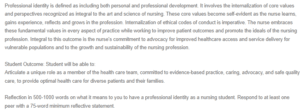Professional Identity Reflection
Having a professional identity as a nursing student is a multifaceted concept that goes beyond just the pursuit of a degree. It encompasses a deep integration of personal and professional development (Rodriguez & Mogarro, 2019). This is based on the fundamental values and perspectives essential to the art and science of nursing. As a nursing student, I see my role as a unique and vital healthcare team member. I commit to upholding the highest standards of care. Being a nursing student involves committing to lifelong learning and development. It involves consistently broadening one’s expertise. This extends beyond the classroom and clinical settings. Moreover, it includes introspection and learning from experienced professionals. It also involves recognizing fundamental nursing values like empathy, compassion, and respect. These are theoretical concepts and important features of our daily practice.
As a nursing student, I am committed to evidence-based practice. This means that I realize the importance of staying up to date with the latest research and clinical guidelines. It involves critically assessing existing evidence and applying it judiciously to provide the best possible care for my patients. Evidence-based practice ensures that I make informed decisions and continuously strive to improve patient outcomes. Caring is at the core of nursing and as a nursing student. I believe that it goes beyond giving medications or performing clinical procedures. It’s about forming genuine connections with patients and their caregivers. Furthermore, it involves understanding their unique needs, fears, and hopes. Caring means being present and compassionate, even in the face of challenging circumstances. It’s about treating every patient with the dignity and respect they deserve. The treatment should be provided regardless of their background, beliefs, or circumstances.
Advocacy is a vital component of my professional identity as a nursing student. I recognize the responsibility to be a voice for those who may not have one. It involves advocating for improved healthcare access and service delivery, more so for vulnerable populations who often face disparities in healthcare. It means standing up for the rights and well-being of patients, ensuring that they receive the care and support they need. Advocacy is a powerful tool for effecting positive change in healthcare systems and policies. Ensuring quality care is a non-negotiable aspect of my role as a nursing student. I understand that patient safety is important. Therefore, I am committed to following best practices to prevent errors and harm. This includes thoroughness, effective communication, and collaboration with the healthcare team. Quality care means consistently delivering the best possible care to every patient (Awad et al., 2021). It also involves a focus on achieving the best outcomes and promoting their overall well-being.
My professional identity as a nursing student also revolves around the principle of providing the best healthcare for diverse patients and their families. It means recognizing and celebrating the rich tapestry of cultures, backgrounds, and beliefs that patients bring with them. It involves adjusting care plans to meet individual needs. One must take into consideration cultural competence and sensitivity. By acknowledging and respecting diversity, I can build trust and rapport with my patients which is essential for effective care delivery.
Overall, having a professional identity as a nursing student is rooted in personal and professional development. It involves embracing core values, such as caring, advocacy, and evidence-based practice, and applying them in every aspect of care. It means recognizing the unique role of a nurse within the healthcare team and striving for excellence in patient care. It’s about being a compassionate advocate for patients’ rights and working towards equitable healthcare for all. Ultimately, it’s a dedication to the growth and sustainability of the nursing profession.
References
Awad, A., Trenfield, S. J., Pollard, T. D., Ong, J. J., Elbadawi, M., McCoubrey, L. E., … & Basit, A. W. (2021). Connected healthcare: Improving patient care using digital health technologies. Advanced Drug Delivery Reviews, 178, 113958. https://doi.org/10.1016/j.addr.2021.113958
Rodrigues, F., & Mogarro, M. J. (2019). Student teachers’ professional identity: A review of research contributions. Educational research review, 28, 100286. https://doi.org/10.1016/j.edurev.2019.100286
ORDER A PLAGIARISM-FREE PAPER HERE
We’ll write everything from scratch
Question

Professional Identity Reflection
Professional identity is defined as including both personal and professional development. It involves the internalization of core values and perspectives recognized as integral to the art and science of nursing. These core values become self-evident as the nurse learns, gains experience, reflects and grows in the profession. Internalization of ethical codes of conduct is imperative. The nurse embraces these fundamental values in every aspect of practice while working to improve patient outcomes and promote the ideals of the nursing profession. Integral to this outcome is the nurse’s commitment to advocacy for improved healthcare access and service delivery for vulnerable populations and to the growth and sustainability of the nursing profession.
Student Outcome: Student will be able to:
Articulate a unique role as a member of the health care team, committed to evidence-based practice, caring, advocacy, and safe quality care, to provide optimal health care for diverse patients and their families.
Reflection in 500-1000 words on what it means to you to have a professional identity as a nursing student. Respond to at least one peer with a 75-word minimum reflective statement.


